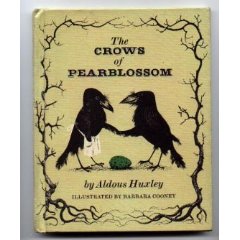
Ann Althouse mentions looking for an Aldous Huxley quote. Below is my favorite Aldous Huxley quote:
I have been told by an eminent academic critic that I am a sad symptom of the failure of an intellectual class in time of crisis. The implication being, I suppose, that the professor and his colleagues are hilarious symptoms of success. The benefactors of humanity deserve due honor and commemoration. Let us build a Pantheon for professors. It should be located among the ruins of one of the gutted cities of Europe or Japan, and over the entrance to the ossuary I would inscribe, in letters six or seven feet high, the simple words: Sacred to the memory of the world’s educators. SI MONUMENTUM REQUIRIS, CIRCUMSPICE.
This, from the preface to the second edition of Brave New World. Brave New World was the first genuine adult literary novel I had ever read, apart from science fiction such as Foundation; my brother brought it home when I was in the fifth grade. I must have read the novel a hundred times, and could recite lengthy passages from memory, without exactly understanding everything. Well, without understanding a lot, starting with the origin of ‘Brave New World’. Or – something I wondered about for several years even after I understood the American version – “she was wonderfully pneumatic.”
The preface was also the first true essay I ever read – I was deeply impressed by the voice, even without understanding the context or theme or what he was driving at. I understood that it was witty, and I understood the cadence of his wit, years before I had any understanding of the content. Another book that fell into exactly that category, one that I read a year or two later, was Camus’s The Fall. I still remember phrases and sentences from it. “Modern man – he fornicated and read the newspapers, and after that, if I may say so, the subject was exhausted.” It was a long time before I got the joke, but I immediately knew that it was witty. I loved the cadence of French wit before I understood what it was about.
Update: Ann Althouse was kind enough to link here, so let me add something. When I say a hundred times, no doubt I exaggerate somewhat. But possibly not that much. That’s because, at least in my family of seven kids, reading was what you did non-stop, all the time. We had a lot of books for the time, I guess, lots of kids books, grownup books, but reading was what you did in any spare moment. It was what you did waiting for Mom to get out of x, y, or z while you were sitting endlessly in the car. It was the default option. And all of us tended to pick up books we had read a zillion times, flip it open to any page and re-read. It wasn’t that Brave New World was my favorite book or that the books that got re-read were the great books – they were entertaining and convenient to hand and easy to jump back into.
Our reading was utterly indiscriminate and unguided. One minute, some Weekly Reader Book Club paperback – but then, one summer doing a week long campout at the beach in San Diego while my father was doing some chemistry professor conference, and it rained endlessly, my mother let my brother and me by a sci fi novel in the drugstore just to keep us busy, and it turned out to be the first volume of James Blish’s Cities in Flight, They Shall Have Stars. My god. We sat in the car in the rain for days, fighting for a while over who was reading when, and then finally simply reading over each other’s shoulders.
I didn’t have to “get over” Huxley because I never thought he was the greatest. I just liked reading him and so I did. I never read anything else by him, wasn’t drawn to him or his writing. I was completely indifferent to his drug stuff, never had the faintest interest in the rest of his work. (The only exception being the complete and utter accident of a children’s book, one that is on my daughter’s shelf and which she always liked a lot, written by Huxley himself, The Crows of Pearblossom. Huxley spent time in Pearblossom, which is a desert town – now one of the endless subprime suburbs of the Inland Empire of San Bernardino County, on the back side of the burning Angeles Crest, that at the time was a tiny desert hamlet on the road to the upper Mojave. Huxley wrote the story, the only one he ever wrote for children apparently, for the six year old daughter of a family friend when he lived there. I liked the story, and anyway I knew Pearblossom from my childhood, so it meant something to me. The book must be quite rare by now, unless it has been reissued by some press.)
I didn’t consciously memorize whole sections; it was just something about that age in childhood, when it slipped effortlessly into the brain. It was when literature actually spoke to me, and even in not very good stories, I could hear them in my head. God, don’t you miss those days? It was what made me want to write things, to be able to have a voice that I could hear for myself. The point I was trying to make was that it was less content that drove me to want to write things – and as a professor, I’m just a dried up version of a fiction writer or journalist who, ironically, has found his tenured niche while watching the economic model of his genuine writer friends collapse around them – and fundamentally wanting to have a voice.